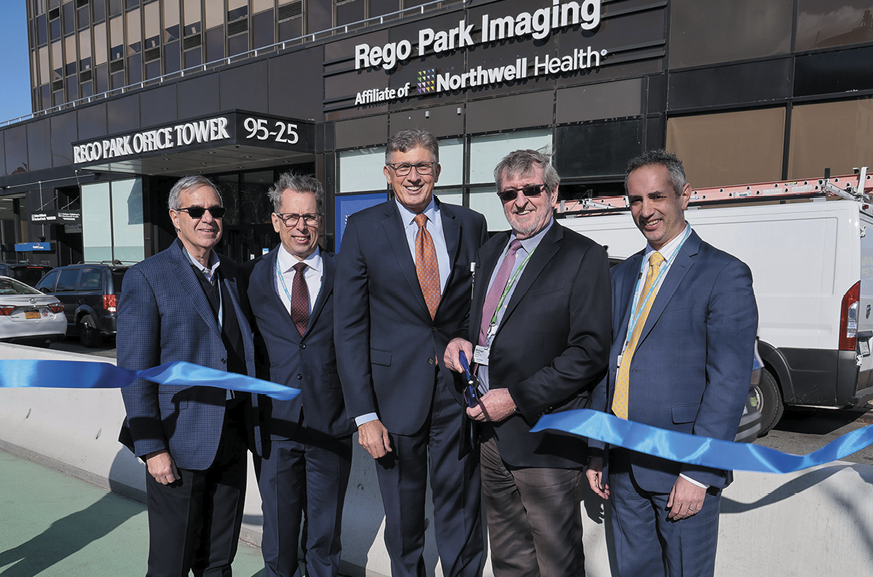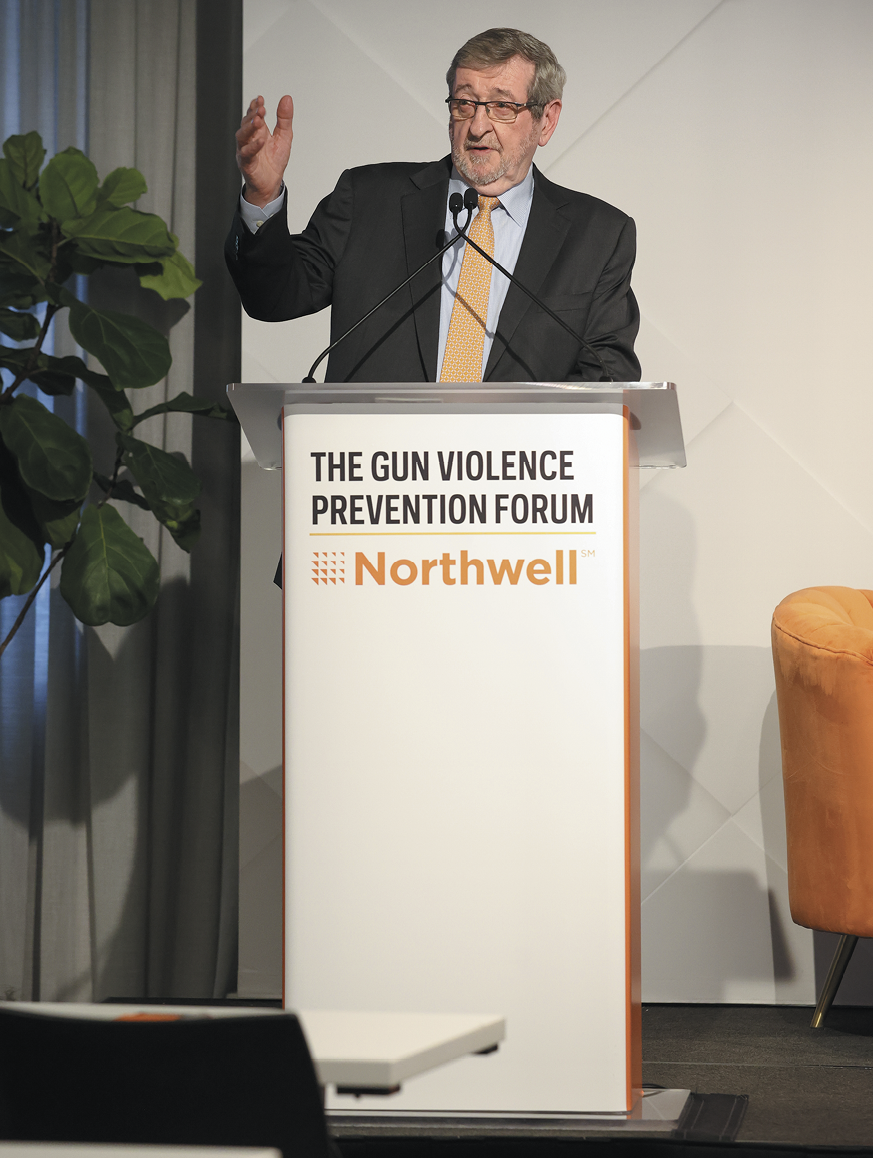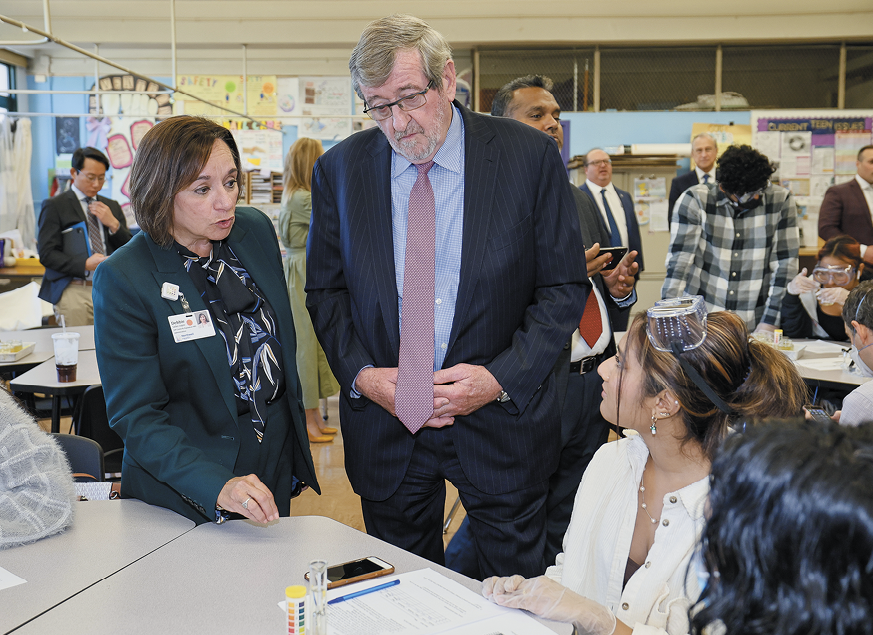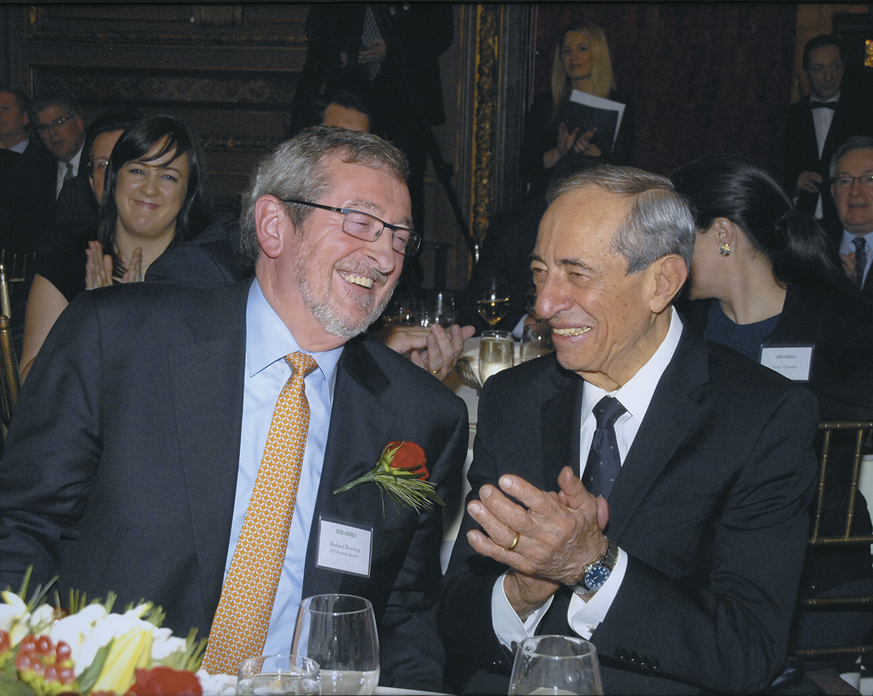- Home
- Media Kit
- MediaJet
- Current Issue
- Past Issues
- Ad Specs-Submission
- Reprints (PDF)
- Photo Specifications (PDF)
- Contact Us
- PRIVACY POLICY
- TERMS OF USE
![]()
ONLINE
![]()
ONLINE

The Future Of Healthcare
Editors’ Note
Michael Dowling is one of healthcare’s most influential voices, taking a stand on societal issues such as gun violence and immigration that many health system CEOs shy away from. His leadership has been invaluable to Northwell’s consistent expansion and prominence. In March 2020, he successfully navigated the health system through the first COVID-19 epicenter in the U.S., detailing Northwell’s experiences in a book titled, Leading Through a Pandemic: The Inside Story of Humanity, Innovation, and Lessons Learned During the COVID-19 Crisis. Overall, Northwell treated over 300,000 COVID patients – more than any other U.S. health system.
Prior to becoming CEO in 2002 and joining Northwell in 1995, Dowling served in New York State government for 12 years, including seven years as State Director of Health, Education, and Human Services and Deputy Secretary to the Governor. He was also Commissioner of the State Department of Social Services. Earlier, he was a Professor of Social Policy and Assistant Dean at the Fordham University Graduate School of Social Services and Director of the Fordham campus in Westchester County. Dowling has been honored with many awards and recognitions over the years, including the Ellis Island Medal of Honor, the Presidential Distinguished Service Award for the Irish Abroad, the Alfred E. Smith Award from the American Society for Public Administration, the National Human Relations Award from the American Jewish Committee, and the Foreign Policy Association Medal Award. In 2017, he was selected to serve as the Grand Marshal of New York’s St. Patrick’s Day Parade. In 2022, he was named the most influential leader in healthcare by Modern Healthcare, ranking #1 in its annual list of the “100 Most Powerful People in Healthcare,” making it the 16th consecutive year he was featured.
Dowling is past Chair of the Healthcare Institute and the current Chair of the Institute for Healthcare Improvement (IHI). He is a member of the Institute of Medicine of the National Academies of Sciences and the North American Board of the Smurfit School of Business at University College, Dublin, Ireland. He also serves as a board member of the Long Island Association. He is past chair and a current board member of the National Center for Healthcare Leadership (NCHL), the Greater New York Hospital Association, the Healthcare Association of New York State, and the League of Voluntary Hospitals of New York. Dowling was an instructor at the Center for Continuing Professional Education at the Harvard School of Public Health. He earned his undergraduate degree from University College Cork (UCC), Ireland, and his master’s degree from Fordham University. He also has honorary doctorates from the prestigious Queen’s University Belfast, University College Dublin, Hofstra University, Dowling College, and Fordham University.
Institution Brief
Northwell Health (northwell.edu) is a clinical, academic and research enterprise with a workforce of more than 87,000 and annual revenue of $18.0 billion. Northwell is the largest healthcare provider and private employer in New York State, caring for more than two million people annually through a vast network of more than 890 outpatient facilities, including 220 primary care practices, 52 urgent care centers, home care, rehabilitation, and end-of-life programs, and 21 hospitals. Northwell also pursues pioneering research at the Feinstein Institutes for Medical Research and a visionary approach to medical education highlighted by the Zucker School of Medicine, the Hofstra Northwell School of Nursing and Physician Assistant Studies, and one of the nation’s largest medical residency and fellowship programs.

Northwell Health leadership (from left): COO Mark Solazzo;
John D’Angelo, MD; Rich Barakat, MD; CEO Michael Dowling;
and Jesse Chusid, MD, cut the ribbon at Northwell Health
in the heart of Queens, New York at Rego Park, a $52 million,
70,000-square-foot transformative suite of
medical practices covering a host of conditions
What has allowed Northwell Health to remain nimble and agile while being the largest health system in New York?
This is a fundamental part of our culture – the most important ingredient in any organization. When we evaluate for positions of leadership, we look for people who have a positive attitude, are adaptable and have a forward-focused mindset. While we are a very large organization, we are very integrated and interdependent. The senior leadership team are all in the same central location which allows us to make decisions quickly and decisively. We place a premium on communication so when decisions are made they are communicated throughout the organization.
We believe in making the complex simple, rather than making the simple complex. We do not over analyze issues – we meet, make decisions, and execute.
Will you discuss the depth of Northwell Health’s capabilities?
This is one of the areas that makes us unique – we do everything. We are involved in cancer, neurology, orthopedics, transplant, community health, education, research, and so on. While we do everything, it is all for one single purpose – improving the condition of people in the community. We remain focused on the result. We are addicted to customer service.
It is extraordinary what we can do today that would have been unimaginable decades ago – the result of research discovery and technological innovation. Such advances in medicine are reasons to be extremely proud. We do great work but to improve overall community health, we must do more. Medical care delivery, as great as it is, only contributes about 20 percent to the improvement of overall health. We must go upstream to address lifestyle and behavior issues as well as societal issues, such as poverty, inequity, gun violence, environmental health issues, etc. Also, the growing addiction to social media and its impact on mental health, especially in children.
Health providers have a major responsibility here – and at Northwell, we take it seriously – but it must be seen as a responsibility of all industry and business leaders. It’s a collective responsibility.
“It is extraordinary what we can do today that would have been unimaginable decades ago – the result of research discovery and technological innovation.”
Northwell Health has taken a leadership role in addressing gun violence. Have you seen progress in tackling this public health issue?
There is one statistic that I believe is shocking – guns are the leading cause of death for children and adolescents. This is not how the U.S. should be distinctive. We at Northwell have been taking a leading role on this issue for many years. We created a Division of Gun Violence Prevention and Safety, we hold an annual Gun Violence Prevention Forum each year, and we have established a national CEO Council on Gun Violence to also focus on prevention and safety. We work with other organizations and government to address this important public health issue and we’re very satisfied recently to see President Biden establish a White House Task Force on the issue, and we applaud Senator Chris Murphy for his national leadership for the passage a few years ago of the Bipartisan Safer Communities Act.
The good news is that there has been some incremental improvements – improvements worth celebrating. Over the past two years, gun homicides have dropped nearly 8 percent, according to provisional data from the U.S. Centers for Disease Control & Prevention.
I see a growing recognition and activity by more leaders, in all businesses, that progress must continue. It is gaining more traction as a public health issue. It’s a long-term issue just like the effort years ago to improve automobile safety (airbags and seat belts). Of course, it will eventually require major and additional legislative action out of Washington.

Michael Dowling at Northwell’s fifth annual
Gun Violence Prevention Forum where healthcare, government,
business, and community leaders convene annually
to discuss addressing gun violence as a public health crisis and
how to change the landscape of gun violence-related
injuries and deaths in the country
How can business leaders address these long-term challenges with the pressures for short-term, quarter-to-quarter business results?
You manage for the short term but lead for the long term. You have to do both but leaders, in my view, should be focused on the next three to five years – what’s the vision, what’s the destination, what are the long-term metrics. An effective CEO can drive results in the short term, while investing for the long term. It’s no different in a non-for-profit entity like Northwell. Achieving sustainable results takes time.
Northwell Health is investing in new technology, data analytics, and AI. How do you make sure that these areas do not take away from the human touch and people part of the business?
Technology and AI have contributed enormously to the improvement in healthcare delivery and will continue to do so. The new AI capabilities will help with diagnostic improvement, data analytics and operational performance and efficiency. We will have to be aware however of the potential dangers of falsehoods and misinformation. We must proceed with a combination of speed and caution.
While we optimize the use of technology we must not – especially in healthcare delivery – have it substitute for the importance of human contact. The person-to-person social relationship is so important. The leadership task is to find and secure the right balance – like we struggle with in other areas such as centralization versus decentralization, integration versus autonomy, privacy versus transparency, etc. It’s one of the challenges of leadership.
“Northwell Holdings is a separate entity within the organization with the goal of advancing innovation, building for-profit business, and identifying alternative revenue streams to support the ongoing mission work of the company.”
Will you discuss the work of Northwell Holdings and how you define its mission?
Northwell Holdings is a separate entity within the organization with the goal of advancing innovation, building for-profit business, and identifying alternative revenue streams to support the ongoing mission work of the company. There is a reality to the health provider business that is not fully appreciated. The bulk – over 60 percent – of our revenue comes directly and indirectly from government. This is a combination of Medicare and Medicaid. Medicaid – which is growing does not cover the cost of delivery care. While Medicare is better it also does not cover the full cost. All providers have to negotiate with the commercial insurance companies to attain reimbursement to cross-subsidize the low reimbursement from government.
Creating alternative revenue via joint ventures, investing in business companies (such as technology) and creating our own businesses is therefore imperative. It’s being entrepreneurial. It’s about optimizing and commercializing certain assets of the organization. This is why we have established a for-profit set of businesses such as pharmacy (Vivo Health), transportation, laboratory services, and our own GPO (Group Purchasing Organization). This is an expanding and robust endeavor that will expand and grow. We are open to all innovative ventures and partnerships.

Michael Dowling meets with a student at Hillcrest High School
in Queens. Northwell is the first Student Pathways anchor
employer partner for New York City Schools, providing up
to 150 internships to 12th graders at four high schools to
give students meaningful, career-connected learning
from health care professionals
How critical is it for Northwell Health to have such an engaged and supportive board?
The relationship between its Board and leadership is obviously critical but requires ongoing and productive communication. Trust is an imperative. We are fortunate at Northwell to have an engaged, knowledgeable, and supportive Board – a Board that also understands their role versus that of management. The Board has a fiduciary responsibility to hold leadership accountable on doing what’s right for the community. Management needs to be transparent and with the Board develop and articulate a clear strategy and vision and then execute. It’s a two-way process that is based on integrity, transparency, honesty, and trust. I have been fortunate with such a Board relationship.
“Innovation is at the foundation of everything we do. However, we have to be cognizant of making sure innovation is not constrained by overbearing regulations and compliance. The freedom to do ‘new and different’ must be encouraged.”
The pandemic shined a light on the critical role of healthcare workers, but this work is done day in and day out at health systems across the country. What do you tell people about a career in healthcare?
Those of us in healthcare – especially on the provider side – are very fortunate. Each day we improve lives, cure disease, reunite families, bring new individuals into the world, and care for the disabled, elderly, and frail – how inspiring and motivating. I discuss this obligation when I meet with new employees each week (usually about 250). Their role and commitments were in stark display during COVID and the public at the time were so appreciative – and rightly so. Healthcare workers are the core defense against healthcare disasters when such disasters (like COVID) occur. But, of course memories fade and criticism reappears – as it has. Healthcare workers work hard and are proud to be in a profession dedicated to improving people’s lives.

Michael Dowling with one of his mentors,
former New York Governor Mario Cuomo
How is Northwell Health innovating when it comes to its medical school and nursing school?
When we decided to create the medical and nursing school, we were determined not to replicate the status quo. We wanted to innovate, to refashion a new curriculum and provide a creative learning experience. We have done that and we believe very successfully. For example – in the medical school all students are trained as EMTs in the first nine weeks and all are immediately in the field with patients – seeing, experiencing and learning. I am an advocate of apprenticeship – you learn best by doing. The school is now highly nationally ranked and our students do their residencies in the top places in the country. The same applies to the nursing school.
Innovation is at the foundation of everything we do. However, we have to be cognizant of making sure innovation is not constrained by overbearing regulations and compliance. The freedom to do “new and different” must be encouraged.
You mentioned earlier the need to find role models. Did you have role models in your life that impacted your journey?
There have been many.
My mother was a role model. She was an unbelievably caring person who never let deprivation diminish her optimism. She had all the reasons to complain – she had a difficult life, but you would never know and she would never admit it. She would give advice such as – don’t ever let your current circumstance limit your future potential. I always remember such words.
Former Governor Mario Cuomo was a major influence in my life. Mario Cuomo was a big role model for me. I had nothing in my background that would justify the opportunities he gave me, but he saw something in me and gave me a chance. He threw me into the deep end of the pool and believed I could do it. This is something I have taken with me in my management style. If you stretch good people, they will blossom. You learn by doing, and you learn by failing. Let hard work, positive attitude, resilience, decency and respect set you apart.![]()